Women in bees-ness
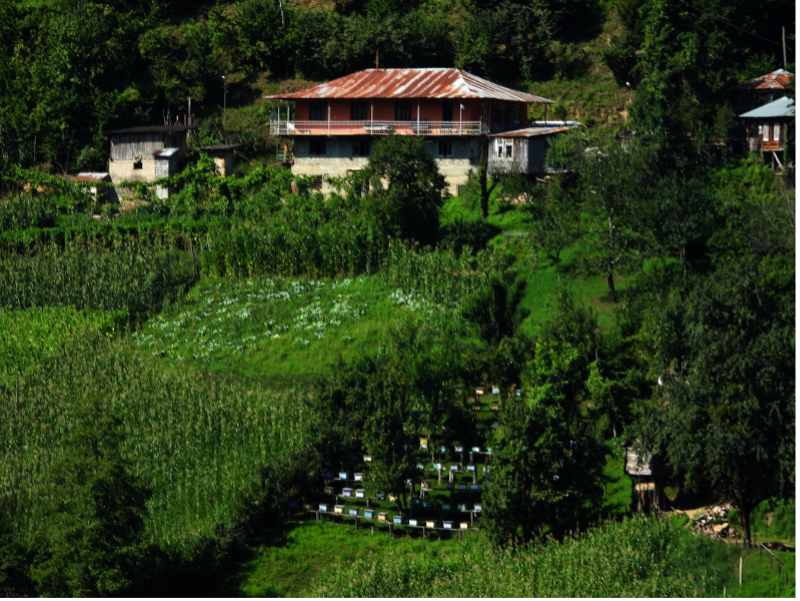
Summary
Women in bees-ness was implemented in Ambrolauri municipality, Georgia from 2015 to 2016. The main objective of the solution was to strengthen the community, especially women affected by natural disasters in remote mountainous area, and to support the local municipality to adopt the Climate Change Adaptation Plan.
The Ambrolauri municipality in north-western Georgia is home to about 11,000 inhabitants who live within the vicinity of large deciduous forests and abundant water resources. With an average altitude of 500 masl, winters can be harsh, whereas summers are long and mild. Mining has been a driver of the local economy in Soviet times. In recent years, activities have shifted towards forestry and agriculture.
The 57 villages of the Ambrolauri municipality belong to 22 percent of Georgia’s surface area at high risk of landslides. According to the Climate Change National Adaptation Plan for Agriculture Sector, the frequency of natural hazards is expected to increase across Georgia due to warming temperatures. In the absence of adaptation measures, agricultural productivity in the Ambrolauri municipality will be reduced and interrupted by reoccurring landslides, flooding, and other climate risks even more so than it is today. Precipitation change is also expected to reduce access to irrigation and negatively affect agriculture. Moreover, the degradation of forests will limit their protective function, thus further contributing to a decrease in water availability.
Overview
- Location:
- Implementation sites:
- Single country
- Single location
- Mountain region:
- Ambrolauri Municipality, Nikortsminda
- Province:
- Racha region
- Site locations:
In the Racha region, Georgia, the project targeted two locations: Ambrolauri city and Nikortsminda
- Solution scale:
- Ecosystem type(s):
- Solution type(s):
- Sector(s):
- Climate impact(s) addressed:
- Impact time-scales:
- Benefits:
- Co-benefits:
- Implementation timeline:
- 2015 - 2016
Solution details
Main beneficiaries & outcomes
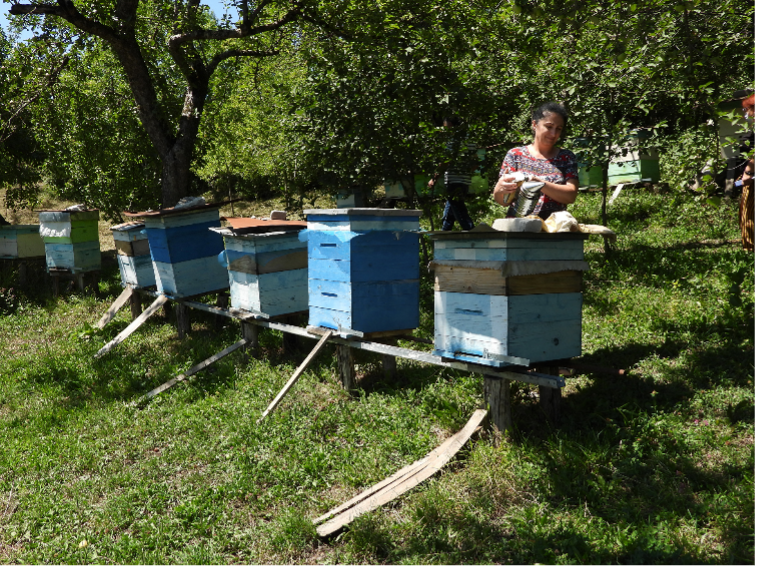
Beehives in the Ambrolauri municipality. @Sustainable Caucasus
Natia Geladze, a beneficiary from Ambrolauri
“In 2015, within the project for women, our family got hives with bee [colonies] for free to start beekeeping. The expert who trained us also lives in our village, and when we have questions, he is always ready to give free consultations. Currently, we are selling honey to the domestic market. This business is profitable because the demand for honey is high, and the price has also increased in the last few years. Involvement in this project was a good decision.”
The solution was implemented within the Ambrolauri municipality and included villager women who had been affected by natural disasters living in poor conditions. To strengthen women’s involvement in business, diversify and improve their livelihoods, and support the agricultural sector in the Ambrolauri municipality, the bee-keeping practice was promoted with several bee colonies to the groups of women as an incentive to start their own honey-making business and ensured that the women received relevant theoretical and practical training.
To enable the women to operate their business, a small shop was opened near the main road in the Nikortsminda village, offering a permanent free place for women to sell the product and generate revenue. With the training and knowledge, the women promote beekeeping and biodiversity conservation measures within their communities and beyond. This type of solution can be implemented in different parts of the South Caucasus and other remote mountain regions and can have a particularly positive effect in communities where rural emigration rates are high and women’s inclusion in local businesses is low. Through providing a lucrative option for income generation, especially for women, it contributes to poverty reduction by shifting dependence from forest resource use, thus increasing the resilience of households to climate change-induced impacts. Important enabling factors include the formulation of a local adaptation plan, peer-to-peer exchanges, and learning, considering and linking to tourist infrastructure for marketing and sales as well as raising awareness of the environmental co-benefits of beekeeping.
The number of pollinators is decreasing in many regions of the world, meaning that this solution combines community with environmental benefits for several mountain regions. In hilly areas where agriculture and increased erosion cause land degradation, promoting beekeeping can assist with restoring vegetation cover, thus reducing the threat of erosion and landslides. It is important to note that the honeybee species selected need to be adapted to the climate and environment in which it is being introduced.
Planning and implementation
Looking at Georgian society, women are considered more affected by climate change, mostly due to a higher vulnerability to natural disasters than men, and various gender-specific cultural, social, and economic barriers leading to less food security. In Ambrolauri, there is also a high proportion of women living below the poverty line, further increasing their vulnerability to climate change.
The main organizations implementing these small-scale adaptation projects, including the beekeeping solution, were: ECOVISION, GAWB and WWF-Caucasus. In the framework of the European Union (EU)-funded Climate Forum East II, the non-governmental organization (NGO) ECOVISION developed a Climate Change Adaptation Plan for Ambrolauri City and the Ambrolauri Municipality. The adaptation plan aims to strengthen local ecosystems and their services and create alternative income sources for the municipality`s population. As a first step, a climate risk assessment was developed, and – with the technical support of the World Wide Fund for Nature (WWF)-Caucasus – modeling was used to forecast impacts of climate change-induced land degradation and biodiversity loss in Ambrolauri forest ecosystems. The assessment also looked at the social dimension and found that women and youth were particularly vulnerable. A specific Local Adaptation Plan on Biodiversity Protection was developed that includes forest adaptation measures but also provisions for awareness-raising. This included tools to inform communities about alternatives to livelihoods based on forest resource use for which the local NGO “Georgian Association Women in Business” (GAWB) was tasked with implementation.
To strengthen women’s involvement in businesses, diversify and improve their livelihoods, and support the local economy in the municipality of Ambrolauri, GAWB offered training on alternative income opportunities such as beekeeping and marketing of local products along with awareness-raising for biodiversity conservation. They provided both women already in the honey-making business and women new to beekeeping with several bee colonies as an incentive to start their own business and ensured that they received relevant theoretical and practical support for beekeeping, honey production, packaging, and sales.
For women to generate revenue from their businesses, a small shop was opened near the main road in the Nikortsminda village, offering a permanent and free place for women to sell their products, including the local well-known ‘Lobiani’ bread with bean, and exchange within the community. The shop is placed on a frequently visited tourist route to cultural heritage sites in Ambrolauri municipality and was therefore successfully embedded into the local tourist infrastructure, thus supporting direct supply chains from production to local sales. To foster sustainability, a social enterprise for the management of the beehives has been created which is supposed to increase revenue and further enhance the promotion of this alternative income opportunity.
The expansion of beekeeping practices is also beneficial for the environment as it is expected to increase pollination via the local Caucasian honeybee (Apis mellifera Caucasia). These bees are known for being gentle and easy to handle, producing large quantities of honey, and are adapted to the climate of the Caucasus mountains. Bees are a major pollinator of crops and wild plants and therefore play a crucial role in agricultural production. Moreover, the improved pollination leads to more plant reproduction and transport of seeds, hence increasing vegetation cover. This has positive effects reducing the exposure to erosion on mountain slopes.
For women to generate revenue from their businesses, a near the main road in the Nikortsminda village, offering a permanent and free place for women to sell their products, including the local well-known ‘Lobiani’ bread with bean, and exchange within the community. The shop is placed on a frequently visited tourist route to cultural heritage sites in Ambrolauri municipality and was therefore successfully embedded into the local tourist infrastructure, thus supporting direct supply chains from production to local sales.
Finance
The project was implemented under the European Union-funded Climate Forum East II.
Innovation
This solution can be considered innovative as it can reduce poor women’s vulnerability to climate change by strengthening their role in society and within the family, increasing household income. Important enabling factors include the formulation of a local adaptation action plan, peer-to-peer exchanges and learning as well as a focus on co-benefits of beekeeping.
Performance evaluation
No performance evaluation has been done.
Long term project sustainability and maintenance
The sustainability of the solution is utilized through the ownership by the beneficiaries. The community is still operating the beekeeping practice, the demand of honey is getting high, and the price of the product spikes over time.
Capacities for design and implementation
Knowledge

Honey in the hives before harvesting time in Ambrolauri. @ Sustainable Caucasus
The beekeeping business requires special knowledge, for this reason, a local expert was hired and relevant theoretical and practical knowledge was provided to the local women. The local expert gives free consultations to the project’s beneficiaries as needed. The community, through the experts’ involvement and peer- to peer learning gained knowledge on climate change threats in their municipality, their rights, and climate adaptation measures.
Political / Legal
Ambrolaury municipality was one of the stakeholders and within the project, the municipality adopted a climate change adaptation plan. The local government supported the project’s activity to guarantee a free marketplace for women to sell local products and generate additional revenue.
Institutional
The solution was initiated within the Climate Forum East II and implemented by the various NGOs ECOVISION in close cooperation with the local government supported in developing the climate adaptation plan for Ambrolauri City and the Ambrolauri Municipality. WWF-Caucasus was involved in climate risk assessment to predict the negative impacts of climate change-induced land degradation and biodiversity loss. The NGO GAWB ensured the women’s engagement in the project implied providing bee colonies to the group of women with the relevant theoretical and practical training.
Socio-cultural
Interviews with the GAWB representative and the project’s beneficiaries show that the local community was actively involved in the solution’s implementation. f.e., the project hired a local bee expert for the training component who provides constant free consultations and recommendations to the community regarding the honey-bee practice after the project. The project also hired a local wood craftsman for making the hives for the project’s activity to promote local specialists’ work that created a cooperative environment in the community.
Outlook & Scalability
Transformation and future outlook
The main objective of the solution was to increase community resilience of Ambrolauri Municiplaity to the natural hazards through the filling the gap of missing climate related knowldege and policy at municipality level and create alternative agriculture practice for the community to improve communities economic conditions that co-benefited the envirinoment. The project carried the special focus on women living in a poor condition. The solution increased the interset of women in beekeeping practice and marketing that generated the additional revenue for the families and positively affected the environment.
Potential for upscaling and replication
Supporting ecosystem services such as bee pollination is a Nature-based Solution (NbS) that supports biodiversity in natural vegetation and agricultural produce. Honey is a by-product and provides an additional income source. The engagement of marginalized groups, such as women, is important for ensuring equal access to livelihood opportunities. Educating the local communities, especially women and girls, about environmental change and biodiversity ensures greater ownership by the mountain inhabitants and supports building long-term resilience. This solution exemplifies how seizing local opportunities and targeted training of people can create new livelihood opportunities that have multiple benefits for both communities and their environment.
This type of solution can be implemented in different parts of the South Caucasus and other remote mountain regions and can have a particularly positive effect in communities where rural emigration rates are high and women’s inclusion in local businesses is low. Through providing a lucrative option for income generation, especially for women, it contributes to poverty reduction by shifting dependence from forest resource use, thus increasing the resilience of households to climate change-induced impacts. Important enabling factors include the formulation of a local adaptation plan, peer-to-peer exchanges, and learning, considering and linking to tourist infrastructure for marketing and sales as well as raising awareness of the environmental co-benefits the beekeeping.
Finally
Contacts of key institutional partners involved with the solution planning and implementation
Contact:
Nino Elizbarashvili, president at Georgian Association “Women in Business”
Email: [email protected]
Telephone: +995 577 41-95-57
Website: : www.gawb.ge
Key references/links
Jashi, C. (2017). Challenges and perspectives of gender equality in the agricultural sector of Georgia. International Agricultural Journal, (1).

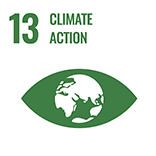
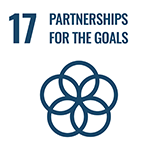
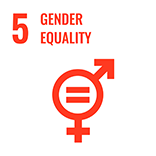
(0) Comments
There is no content